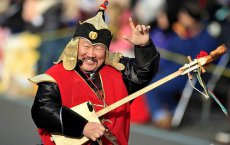 Throat singer Kongar-ool Ondar from Tuva, the tiny region of Siberia just outside of Outer Mongolia, was supposed to have been singing out in three-part harmony — by himself — atop a horse equipped with a stereo amplifier in Tuesday's Rose Parade. Throat singer Kongar-ool Ondar from Tuva, the tiny region of Siberia just outside of Outer Mongolia, was supposed to have been singing out in three-part harmony — by himself — atop a horse equipped with a stereo amplifier in Tuesday's Rose Parade.
The sound equipment was designed to prevent a repeat of his first appearance in 1993, when Ondar, singing without amplification, couldn't be heard over the din of the crowd.
Unfortunately, for reasons not immediately clear, Ondar was silent as he and two bare-chested dancers dubbed Flying Eagles of Tuva exchanged waves and smiles with fans shortly after the start of the parade on the KTLA-TV (Channel 5) broadcast.
It was a sad, silent echo of what happened two decades ago, when the throat-singing horsemen were drowned out during the 1993 Rose Parade by a high school band.
Just before this year's parade, Ondar spokesman Ralph Leighton told The Times that "this time, Ondar will be microphoned so that fans along the parade route can hear him singing multiple notes simultaneously."
According to a 1992 Times article, Tuvans are members of a small band of nomadic Asians who live in southern Siberia and are known for their unusual ability to sing two or more notes at once.
Material provided by the Rose Parade describe Ondar and the Eagles of Tuva as hailing from the region once known as Tannu Tuva.
"The group was formed specially for this year's theme, 'Oh, the places you'll go!', as Tuva is one of the most remote and exotic lands on Earth. In an area the size of North Dakota are not just sheep, goats, and cattle, but camels, yaks, and reindeer -- all of them herded by cowboys who can routinely sing two notes at once, as Ondar will do in the parade," parade literature said.
Ondar was dressed as a khan and rode a white quarterhorse that was outfitted with a sound system, while his companions wore traditional, spare Tuvan wrestling costumes.
Ondar appeared on the "Late Show with David Letterman" in 1999.
|
